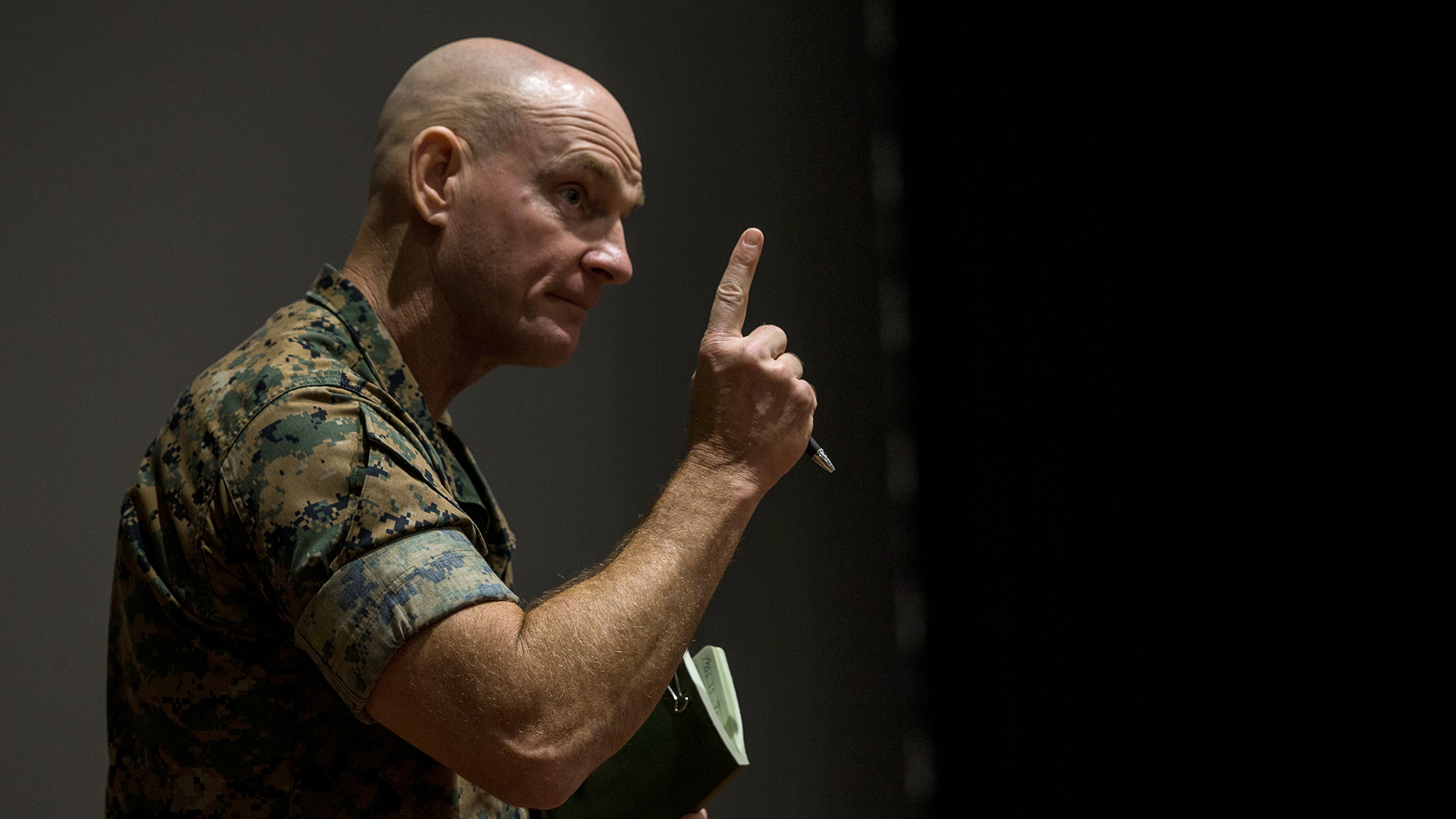

Sgt. Maj. of the Marine Corps Troy Black has spent 35 years working to be the best Marine he could be, but he recently shared that there is one time where he feels he fell short.
In 2010, a Marine under his command was killed by an improvised explosive device while deployed to Afghanistan, and Black has wondered ever since if he could have done more to have prevented the incident from happening, Black recently told Matthew Cothron, who co-hosts the Zero Blog Thirty podcast as “Uncle Chaps.”
Cothron’s March 6 interview with Black covered a variety of topics, including why the Marine Corps is getting rid of its tanks and Scout Snipers. However, toward the end of the interview, Cothron asked Black what he believes his biggest leadership failure has been during his entire Marine Corps career.

After pausing for several seconds, Black said that was not a difficult question to answer.
Black recalled how in 2010 he was serving as the battalion sergeant major for 3rd Battalion, 7th Marines, which was deployed to the Musa Qala district in Helmand province, Afghanistan. One day, a jump platoon — which is tasked with protecting a Marine battalion’s commander and other leaders during missions — had to go outside the wire to bring a Combat Logistics Battalion through friendly lines so it could resupply the unit.
Within five or six minutes of the jump platoon heading out, Black heard an explosion, he said. Black immediately radioed the jump platoon and was told that a Marine was down.
“So, I radioed: ‘How do you know?’” Black recalled. “And he said: ‘Because he’s laying right here in front of us.’”
Black, two other Marines, and a Navy corpsman grabbed their gear and ran towards the scene. It was June at the time, so the weather was “hotter than dog snot,” he said.
When they arrived at the blast site, they learned that the Marine who was killed had not used the proper procedure to deal with an explosive device, Black said. By that time, the Marine had successfully cleared improvised explosive devices a couple hundred of times by using his hands to brush away the dirt around the device, marking it, and then calling for an Explosive Ordnance Disposal technician to take care of it.
“This one time,” Black said, raising a finger to underscore his point, “This one time, he brushed the dirt away with his foot and blew him into a thousand pieces.”
Over the next couple of hours, Black and other Marines collected the remains of the Marine who had stepped on the explosive device. For the whole time during that grisly process, Black kept thinking about one thing: “Did we practice how to do this enough?”

Although Black and his Marines had trained hundreds — if not thousands — of times on what to do when they encountered explosive devices, Black asked himself: “Did we cut it short one day? Should we have done it one more time?”
Nearly 13 years later, Black said he is still not sure whether the Marine’s death is his fault.
“Maybe we should have done that one more time,” said Black, who added that perhaps the Marine had become complacent. “But even with that, why that one time did he decide to use his foot rather than do what you’re supposed to do, after I had seen him do it 100,000 times? Why?”
“You’re talking about living with guilt,” Black continued. “The fact of the matter is you don’t know [whose fault the Marine’s death was]. You asked what my biggest failure was: Probably not doing that one more time.”
The experience of losing the Marine in combat has made Black hyper alert to finding things that look wrong, he said. As the Marine Corps’ top enlisted leader, Black is now more focused making sure every detail is exactly right than when he served as a drill instructor, he said.
Black added that if he were with the jump platoon back in 2010, he might have been able to have seen the Marine preparing to brush dirt away with his foot and intervene before it was too late.
“I’m convinced that if we had done that one more time, maybe that wouldn’t have happened — maybe,” Black said.
The latest on Task & Purpose
- A major US Army formation just dropped new restrictions on tank names
- How Russia uses US military veterans in its propaganda war against Ukraine
- Jon Bernthal is back as The Punisher in ‘Daredevil: Born Again’
- The Russian military is so low on ammo that troops are reduced to fighting with e-tools
- How the World War I Maxim machine gun became a weapon of choice in Ukraine